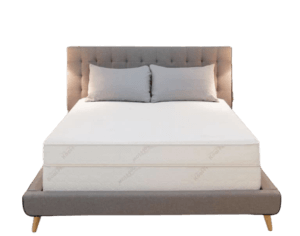The end of winter often means the end of huddling between several heaters, hiding beneath multiple quilts, and refusing to get out of bed because it’s too cold.
However, the heat of summer, and even spring, can bring their own issues. Often, it is the humidity of these seasons that prevents us from sleeping. However, there are also many other ways the warmer weather can affect us. Longer hours of daylight and lack of ventilation contribute to fewer hours and a lower-quality of sleep too.
You can ensure a healthy night’s sleep through the heat with a few simple changes to your routine.
No Daytime Napping
We’ve all had those moments where we have been tempted to take a short nap during the day. That temptation won’t die down as summer rolls around, as the human body is going into overdrive using your energy trying to regulate your temperature. This will leave you feeling a lot more sleepy as a result.
Try to keep yourself awake throughout the day, even if those pillows feel particularly inviting. By staving off the need for sleep during the day, you’ll be more likely to sleep better at night.
Limit Your Exposure to Lighting
Summer will give you plenty of time to try and shield your eyes from the blazing sun. As summer reaches its peak, you may find it difficult to settle down for the night if it’s still bright and sunny when you look out your bedroom window. It’s not just the sun that can disrupt your sleep, but artificial lights as well.
Within your house, try to make use of dim lighting. Research reveals that blue light suppresses your melatonin levels, a key hormone in the sleep cycle. It is also a good idea to avoid screen-time at least an hour before you go to bed.
Consider Your Choice of Bedding
If you’re coming out of the winter season, you’ve probably grown accustomed to a thick winter blanket. In summer you should opt for some lightweight cotton fabrics. If you tend to overheat, consider using a thin, more breathable sheet.
Your mattress quality is key to a good night’s rest. Everyone has a particular preference when it comes to mattresses, which is also expressed with their sleeping position. If this isn’t given the right consideration, you may be sleeping on the wrong mattress for your body.
Latex mattresses are considered a good fit for the summer period. The best latex mattresses allow for improved breathability over other mattress styles, meaning that your body will maintain a cool temperature during hotter seasons.
Drink More Water (at the Right Time)
You’ve all heard of the eternal advice ‘drink plenty of water’ because it’s the best way to keep yourself hydrated during a heatwave. However, you need to time your drinks accordingly. Don’t down several pints just before you go to bed unless you want to be making several late-night trips to the bathroom.
Proceed with caution when it comes to coffee and sugary drinks, as these contain caffeine that may keep you awake. A similar argument can be made for sugary drinks and fast food which will boost your energy levels during the night with no opportunity to expend it. Opt for herbal teas as they have a soothing effect if you want to get settled.
Regulate Your Temperature
Summer sleep time is often dictated by temperature. In fact, there was a study into the most manageable temperatures to sleep at during the summer period, the results showing 60 to 67 degrees Fahrenheit to be the ideal summer temperature for quality sleep.
The heat will often circulate around your bedroom. If you’re not careful, stepping into the room will feel like stepping into a sauna. There are a few things you can do to alleviate the temperature issue: keep your bedroom windows open so that heat can circulate freely and set up a fan in the room to cool the air. Make sure that the fan faces the window, blowing the hot air outward. Many people keep the fan directed at themselves, which simply directs the warm air at their bodies.
Choose Your Exercise Routine Wisely
We all need to exercise to stay fit; but come the summer, we must be a bit more specific with our timing. If you go out for a light jog, you’re more likely to come back with a hot flush. While a night time sprint may seem like a good idea for getting you ready for bed by using up the last of your energy, it actually raises your internal body temperature.
If you’re going to exercise, try to time it a few hours before bedtime. Those working out late in the evening feel less prepared for sleep, with a report from the National Sleep Foundation saying that only 12% of exercisers qualify as sleepy soon after.
Maintain an Even Mindset
This is a tip that is applicable for any season of the year, but especially in the summer period where we may be more prone to lying awake. We have all had moments where the stressors of life bog us down, but imagine dealing with that in a blistering hot bedroom.
You need to take steps to limit the impact the events of the day will have on you. Mindful breathing and similar forms of relaxation are useful in tackling unresolved and necessary stresses.
Have a Bedtime Routine
Our bodies thrive on routine. By implementing regularity before bed, your brain will be able to better prepare for sleep. Knowing when to sleep will allow your body to sleep for the optimum amount of cycles.
You need to bring your body temperature down, so a lukewarm shower is a good way to go about this. Playing music or reading can help relax your thoughts, too. Any consideration you put into your bedtime routine will help and, in the seasons where sleep is more difficult, your body will greatly appreciate it.

